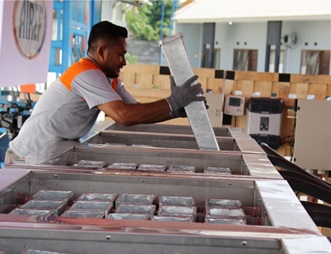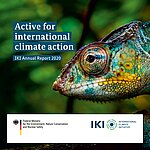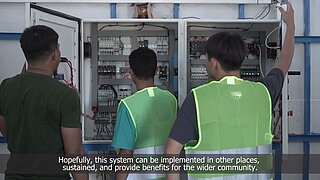Solar ice machines for fresh fish

IKI project and its partners using innovative ideas to expand the use of renewable energy in Indonesia.
The Indonesian archipelago is the world’s second-largest producer of fish. Yet inadequate storage facilities in smaller ports and at small-scale fisheries result in reduced qualities leading to financial losses. The main problem is the lack of high-quality ice that threatens to break the cold chain right at the outset.
One strategy for resolving this problem is supplied by the project ‘Strategic exploration of economic mitigation potentials through renewables’ (ExploRE). This project is supported by International Climate Initiative (IKI) and is being implemented by Deutsche Gesellschaft für Internationale Zusammenarbeit (GIZ) GmbH together with the Indonesian government. This project aims to secure an efficient and sustainable cold chain for Indonesia’s burgeoning fishing industry. As part of the project, Indonesian businesses have joined forces with companies from Germany, Switzerland and other countries in a partnership entitled ‘Turning Sunlight into Opportunities’. They aim to develop a machine that uses sunlight as a decentralised, low-carbon power source to produce blocks of ice.
 The solar ice machine utilises a photovoltaic system integrated with a conventional icemaker. With optimal solar insolation, the machine produces a tonne of ice blocks every day. The solar ice machine operates independently of external electrical or diesel power, even in the most remote regions of the archipelago. It also does not need large battery storage, which makes it more flexible and ensures the catch can be cooled as soon as it has been brought ashore. Compared with a diesel-powered icemaker, the solar ice machine saves 40 tonnes of CO2 and 14,000 litres of diesel per year, while also cutting operating costs by around 30 percent.
The solar ice machine utilises a photovoltaic system integrated with a conventional icemaker. With optimal solar insolation, the machine produces a tonne of ice blocks every day. The solar ice machine operates independently of external electrical or diesel power, even in the most remote regions of the archipelago. It also does not need large battery storage, which makes it more flexible and ensures the catch can be cooled as soon as it has been brought ashore. Compared with a diesel-powered icemaker, the solar ice machine saves 40 tonnes of CO2 and 14,000 litres of diesel per year, while also cutting operating costs by around 30 percent.
The development of the solar ice machine prototype was completed in 2019 and the machine is due to be installed in Sulamu (Kupang, East Nusa Tenggara) in 2021. There are plans to expand the use of the solar ice machine beyond the fishing industry, to improve cold chains in other sectors.
Strategic consulting and innovative pilot projects
The solar ice machine is one part of the overall ExploRE model, which is made up of strategic consulting and innovative pilot projects. ExploRE develops strategies that aim to expand the use of renewable energy sources, to improve economic and social development. Project partners include the Ministry of Energy and Mineral Resources (MEMR), the Ministry of National Development Planning (BAPPENAS), the Finance Ministry and Indonesia’s state-owned utility PLN.
Indonesia can draw on a wide range of resources for biomass, solar/hydropower and geothermal energy. Its National Energy Council has estimated the country’s potential for renewables as 442 GW of future installed capacity. However, a lot still needs to be done to turn this estimated capacity into a reality. In 2018, renewable power made up only 8.8 GW (14 percent) of Indonesia’s total installed capacity. Never the less, the country aims to achieve 23 percent by 2025 and 31 percent by 2050.
Biomass Energy goes to Campus
In another pilot project, ExploRE’s project partners are aiming to promote knowledge transfer in renewable energy, with a particular focus on biomass. With support from the IKI project, the directorate for biomass energy, namely the General Directorate for Novel and Renewable Energies and Energy Savings (Ditjen EBTKE), worked with the Ministry of Energy and Mineral Resources to host ‘Biomass Energy goes to Campus’ events at two universities in 2019 and 2020. These events provided information about the benefits of renewable energy, and encouraged students and academic communities to get involved in the development of biomass energy. This event series is now being expanded to university students throughout Indonesia.
Biogas app for mobile plant monitoring
Opportunities for a career in biomass energy are likely to increase because of the progress being made in digitalisation. This is why the German project partners are currently developing a biogas app for mobile plant monitoring in support of the Indonesian partner ministries. In future, this app will allow biogas plant operators to monitor their facilities and generate on-demand reports, while also helping to improve operational safety. The intention of the app is to promote the rollout of biogas, especially in agriculture, and to improve the state of biomass energy research in Indonesia.
Renewables are helping to achieve Indonesia’s development goals
As an archipelago, renewable energy sources offer Indonesia a wealth of economic benefits. To date, diesel has been the primary source of energy. Since renewable energy makes decentralised power generation possible, it not only reduces local emissions but also cuts the high costs of transportation required for diesel.
In addition to the direct benefits enjoyed by the energy sector, exploiting the potential of renewable energy will also further Indonesia’s long-term development goals and help to mitigate the risks of economic losses due to climate-related disasters. Decentralised renewables, especially PV systems and mini hydroelectric power stations, work autonomously: off-grid and without an external power source. In the event of a natural disaster, renewable power is easier to restore compared to the plants that require external networks and energy sources, and the large-scale infrastructure. Accordingly, the project is contributing to the work that focuses on the interplay between climate, energy, finance and the development of renewables, and is therefore supporting Indonesia to achieve its development goals.
The German and Indonesian project partners are working together closely on shared undertakings and smaller projects. As one example is consultants funded by IKI that are assisting to develop the Indonesian Biomass Energy Roadmap, which aims to finance the planning of biomass and biogas plants using agro-industrial waste as input. One member of the IKI ExploRE project is also a selected member of the National Taskforce for Accelerating the Development of Biogas for Direct Use. This taskforce is completing a technological status quo analysis, drawing up a roadmap and preparing policy recommendations for the sustainable development of biogas. The Indonesian Finance Ministry has also received German support for a study that looks into potential tax incentives for renewable energy projects.
In 2020, the Covid-19 pandemic generated major challenges and obstacles for local project completion and efforts at a global scale.

ExploRE project partners are now utilising an additional EUR 550,000 made available by the Corona Response Package to produce the solar ice machine in a number of pilot projects. Together with the International Pole and Line Foundation (IPNLF), the quality infrastructure for the local production of ‘solar ice’ is being further developed for cold chain improvement as part of the government’s ‘Maluku National Fish Barn’ (M-LIN) programme.
It is to be hoped that ExploRE will be able to play a significant part in mastering these challenges – especially for the renewable energy sector and as part of the overall green recovery. A world of opportunity beckons: the solar ice machine for fresh fish is just one piece in Indonesia’s much larger energy puzzle.
This article is part of the IKI Annual Report 2020 - Active for International Climate Protection. For more information, please visit the special page on the IKI Annual Report 2020.
The link has been copied to the clipboard
Contact
IKI Office
Zukunft – Umwelt – Gesellschaft (ZUG) gGmbH
Stresemannstraße 69-71
10963 Berlin








![[Translate to English:]](/legacy/_processed_/5/5/csm_Indien_EE_Solar_Frau_bfcf99c425.jpg)